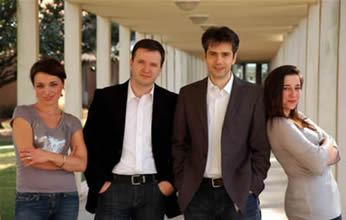By Rev. Virginia Hege Tobiassen, Home Moravian Church, May 18, 2019
The details of the memory are specific: I’m a seventeen-year-old high school student in Raleigh, North Carolina, and on this December night my school’s choral ensemble is headed into a church, ready to sing in a Bach cantata. A light snow is falling. As we walk into the church, we pass between lines of boys on either side of the walk. They are singing “Once in Royal David’s City.” And I am full of joy.
All these years later, some part of my seventeen-year-old self still dwells in this place of joy: a church sidewalk in Raleigh, with snow falling and choir boys singing. When you experience joy in a particular place, some part of you will dwell in that place forever.
I have recently learned that the person responsible for that joyful memory in which I dwell was Thomas Edward Sibley. It was Tom who created the Raleigh Boychoir; Tom who would have been standing there on a snowy night in the mid-1970s, conducting the choir; Tom whose favorite hymn was “Once in Royal David’s City.” Tom, whose place of joy was anywhere he could worship God through music. That’s why Tom’s chief dwelling place was the church.
The first church of his life was in Albemarle, North Carolina, the town where he was born on May 19, 1932. With his parents, Shelley Henry Sibley and Marion Cobb Smith Sibley, and his two younger brothers, Ivan and Dan, he attended First Baptist Church, where he was baptized in 1941. At First Baptist he found a way to give his best gift to the church: a musical prodigy, by high school he was playing piano there for weddings and other services.
Tom grew up on land that his family farmed. As an adult, he loved to dwell in the details of his rural childhood. He told stories, like the time he was riding the family mule when it died under him. There was also the time his mother told him she’d bake a cake if he’d go collect some eggs. Tom knew there was one hen that liked to lay her eggs in the outhouse—she’d sit right on the seat and drop them into the hole below. Tom went looking and, sure enough, when he leaned over and looked into the hole, he could see some eggs were there. He reached in as far as he could, and he tumbled right in, and remained there until rescued. One hopes his mother baked him an extra-good cake.
Tom attended the local schools and in 1950 moved on to a new place of joy: the University of North Carolina at Chapel Hill. It was a place of joy because it was where he studied music, and also where he met Joan Leonard. His parents and her parents had been friends for many years; in fact, when Tom was born, Joan’s parents brought the very first baby gift. But Tom and Joan had never met until Joan was headed to Chapel Hill for a summer session, and her mother said, “You should look up Tom Sibley.” When she did, Tom invited her on a date—to church. At that time he was the organist for a church in Durham; normally, he hitchhiked to Sunday services, but on this occasion he had the good sense to borrow a friend’s car in order to take Joan with him. The two continued to see each other, and love blossomed. Tom’s granddaughter Rachel once asked him how he proposed to Joan. He said it did it very quickly, so she wouldn’t realize what she was doing and change her mind. Rachel says that even after many decades of marriage, Tom always seemed to think Joan was out of his league, and he was very grateful that she’d said yes anyway.
After his graduation in 1954, Tom served two years in the Army. Stationed in Heidelberg, Germany, he worked as an assistant to the army chaplain and directed the chapel choir. Joan’s father was an officer also stationed in Germany, and so it was that Tom and Joan were married in Augsburg on April14, 1956. They honeymooned in Italy and Switzerland—accompanied by Tom’s mother. She had never traveled, so when she flew to Germany for the wedding, Tom and Joan wanted to give her the gift of Europe. So they took her along on the honeymoon, which mostly worked out well, except perhaps the not very romantic gondola ride in Venice, where Joan sat with Tom’s mother while Tom sat with the gondolier.
Tom and Joan returned to Chapel Hill, where Tom studied for his Master’s Degree in Education with an emphasis in Musicology. After graduating, Tom was hired as the Supervisor of Music Education for the Hickory City Schools and served as organist and choirmaster for St. Luke’s United Methodist Church. During their time in Hickory, Tom and Joan welcomed a daughter, Shawn, and then a son, Thomas, Jr.
In 1965 the family moved to Asheville, where Tom worked as Director of Studies for the Asheville School. Two years later the family resettled in Cary, where they stayed for good as Tom enjoyed a long career in education, mostly as Coordinator of Performing and Visual Arts for the Wake County Public Schools. He also continued to dwell in the church, serving as organist and choirmaster of Holy Trinity Lutheran for more than 20 years.
How is it that Tom worked these two demanding jobs and still managed to achieve a larger dream? Yet in 1968, he made that dream come true, establishing the Raleigh Boychoir. It became his true labor of love as he led the choir for forty years. He led them in more than music; he saw the choir as a place where boys could develop character and discipline. Under Tom’s guidance and according to his high expectations, the boys learned not only music but manners, necessary for a group that would travel to so many places where they would need to be on their best behavior. Under Tom’s leadership the Boychoir performed at the White House, Carnegie Hall, The National Cathedral and multiple venues throughout Europe. Thanks to Tom’s work, these were places where these young men would dwell in memory forever. In 1985, after their first tour of Europe, one choir member wrote to thank Tom for all he had done. “Without you as a director,” the chorister wrote, “the Raleigh Boychoir would be nothing but a bunch of misbehaving, musically ‘not very coordinated’ young men.”
For his work with the Boychoir and his many other contributions to the arts, Tom received many awards, including his 2008 induction into the Order of the Long Leaf Pine, North Carolina’s highest honor.
With school, church, and choir, Tom worked, essentially, three full time jobs, each requiring him to draw on a deep well of creativity, resourcefulness, and patience. It would seem too much for anyone—yet Tom’s children and grandchildren remember him as quiet, genial, always positive, kind-spirited, level-headed, gentle, and relaxed. Even in the holiday seasons that demand so much of church musicians, nobody remembers Tom looking busy. He simply dwelled in all that filled his spirit: music, beauty, the church. His son, Tom, says, “Dad was not a competitor; he was a nurturing teacher.” Besides music, he loved gardening. In both school and garden, he loved getting something to grow.
Perhaps this love showed most poignantly in the last years of his teaching career. A new superintendent came into the Wake schools, jobs got reorganized and reassigned, and Tom suddenly became an assistant principal in an elementary school. Such a change, so late in his career, must have been a hard adjustment, yet both of Tom’s children remember this as a time when they learned from their father’s example of faith and perseverance. Tom, Jr., remembers seeing the book When Bad Things Happen to Good People in Tom’s study. He realized his father might be struggling but saw that he was finding comfort in his faith. Shawn says that Tom simply continued doing what he did best: He found the places most in need of nurture and encouragement, and he poured himself into those places. He put everything into bringing joy to lives that needed more color, music, and beauty. He renovated the teachers’ lounge so the teachers could relax in a nicer space. He paid special attention to the needs of children from the most difficult circumstances, and the school blossomed under his care.
Also blossoming were four grandchildren: Vaughn and Lane Sibley and Grace and Rachel Williams, all of whom remember their grandfather as a blend of propriety and playfulness. In fact, only with his grandchildren did Tom really cut loose and play. More than anyone else, perhaps, his grandchildren saw him as full of joy. “I knew he was joyful,” says Vaughn, “through his music and his garden.” Of course they remember his music, and how much he loved sharing it with them. Each grandchild played an instrument or sang, and on every visit Tom would accompany them on piano. They also remember his gardening and how much he delighted in beauty. “You could tell he saw God’s beauty in things,” says Rachel. “Especially in his garden. He had such passion for the beauty.” Rachel thinks of her grandfather most at Easter, because that’s when things are blooming and beautiful like his garden.
Among the many things they learned from him, here are a few. Rachel learned to love travel—and coffee, which Tom would encourage her to sample at the Fresh Market. Lane learned to love nature and being outside. Vaughn learned piano and croquet. Grace learned how to whistle.
All of them learned from his example of faithfulness and kindness. Vaughn says, “I learned a lot about the way Jesus would love people from the way he loved people.”
In retirement Tom took even more to traveling. He and Joan went all over Europe, where Tom could find his way to a piano or organ in any church, anywhere. This was what he most loved about Europe: the churches. This was where he was always most at home: behind a keyboard, inside a church, dwelling in the beauty and thanking God by making music.
In 2010, Tom and Joan relocated to Winston-Salem to be nearer to their children and grandchildren. On January 15, 2012, they joined Home Moravian Church, where Tom dwelled again in joy, as he worshipped the God who made him joyful.
In 2014 a serious auto accident took a toll on both Tom and Joan. Tom recovered more slowly. Just as he was making good progress, a fall created more problems, and he moved into the health care facility of Arbor Acres. Suffering from vascular dementia, he lost his mobility and then his sight. Yet there was much that he never lost: the names and texts of hymns; his awareness of Joan; and, through God’s mercy, his hearing. Pastoral visitors remember how moved Tom was, right till the end of his life, by the sound of familiar liturgies, prayers, and especially hymns.
Quietly, suddenly, very early in the morning of April 12, Tom Sibley left this earthly place to dwell forever in another, within the more immediate presence of Jesus Christ. He had reached the age of 86 years, 10 months, and 24 days.
Tom was preceded in death by his parents and by a brother, Ivan. He is survived by his wife of 63 years, Joan Leonard Sibley; a daughter, Shawn Williams, and husband Joeff; a son, Tom, Jr., and wife Wendy; granddaughters Grace London (with husband Chase), Vaughn Sibley, and Rachel Williams; grandson Lane Sibley; brother Dan Sibley; sister-in-law Mary Kathryn Sibley; and cousin Sarah Gamble.
When we experience joy in some particular place, part of us dwells in that place forever. Tom was a joyful man, maybe because it didn’t take much to bring him joy: a song; a garden; a keyboard; the inside of a church. Because Tom dwelled in joy, some part of his heart is in every joyful place he ever knew—and in each one of you as well, because you gave him joy. And he created places for your joy to dwell: a joy of discipline, and belief that you could do and be your best and also take pleasure in simple things. Those places of joy are a snowy sidewalk lined by choir boys; a garden; the place where you tasted your first cup of coffee; a European cathedral in which you sang; that stable in Royal David’s city, beside Mary, singing to Jesus in the cattle shed. We dwell there because Tom brought us there, and Tom brought us there because giving us joy was really his way of worshipping God. May he dwell now in the place of his greatest joy: in the house of the Lord, forever.
Reprinted with permission of Rev. Virginia Hege Tobiassen, Home Moravian Church, Winston-Salem













